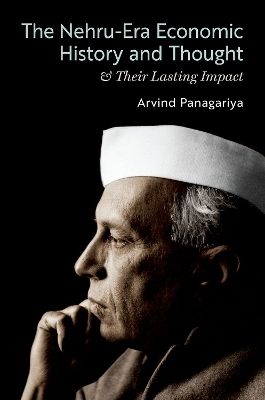
The Nehru-Era Economic History and Thought & Their Lasting Impact
Oxford University Press Inc (Verlag)
978-0-19-777461-8 (ISBN)
- Lieferbar (Termin unbekannt)
- Versandkostenfrei
- Auch auf Rechnung
- Artikel merken
India's economic model underwent transformational change following independence in 1947. The country's first Prime Minister, Jawaharlal Nehru, embarked upon two foundational projects to build modern India: a political project aimed at establishing democracy with universal suffrage, and an economic one aimed at ending poverty. Three-quarters of a century later, his political project is a resounding success, but the opposite is true of the economic one.
The Nehru-Era Economic History and Thought & Their Lasting Impact examines the evolution of Nehru's economic philosophy with socialism, self-sufficiency, and heavy-industry development at its core. Through extensive archival research, Arvind Panagariya reconstructs and reinterprets this history, paying particular attention to the administrative processes deployed to implement policies, contemporary economic thought, and important historical events not adequately covered in the existing literature. He assesses the evolution of Nehru's own political beliefs and the construction of the Nehru development model, the resulting regime and exclusionary nature of economic growth, and the lasting intellectual legacy of the Nehru-era socialism on politicians, civil servants, policy analysts, and businesspeople in the six decades since Nehru's death.
This book is the fascinating tale of a model with the near-unanimous approval of experts from all around the world at its inception and the impact of its failure.
Arvind Panagariya is a Professor of Economics in the School of International and Public Affairs at Columbia University. He was the first Vice Chairman of the NITI Aayog, Government of India, in the rank of a cabinet minister. He has authored more than 20 books, published professional articles in all the top Economics journals, and written for Foreign Affairs, Foreign Policy, and the WSJ. In 2012, the Government of India awarded him with Padma Bhushan, its third highest honor in any field.
1: Introduction
Part I The Economic Thought: Nehru and Others
2: Nehru: From Radical to Fabian Socialist
3: The Nehru Development Model
4: Other Contemporary Influential Voices
Part II The Economic History: Implementation and Outcomes
5: Industrial and Labor Policies
6: Implementation: Target-Setting and Industrial Licensing
7: A Liberal Import Regime: 1882-1956
8: A Highly Restrictive Import Regime: 1957 to 1964
9: Export and Foreign Investment Policies
10: Growth, Industrialization, and Poverty
Part III The Lasting Impact
11: The Political Leadership I: 1950-84
12: The Political Leadership II: 1985-2023
13: Institutions and the Business Community
14: Economists and Other Policy Analysts
15: An Afterthought
| Erscheinungsdatum | 29.08.2024 |
|---|---|
| Zusatzinfo | 20 figures and tables |
| Verlagsort | New York |
| Sprache | englisch |
| Maße | 156 x 235 mm |
| Themenwelt | Geschichte ► Teilgebiete der Geschichte ► Wirtschaftsgeschichte |
| Wirtschaft ► Volkswirtschaftslehre ► Wirtschaftspolitik | |
| ISBN-10 | 0-19-777461-X / 019777461X |
| ISBN-13 | 978-0-19-777461-8 / 9780197774618 |
| Zustand | Neuware |
| Haben Sie eine Frage zum Produkt? |
aus dem Bereich


